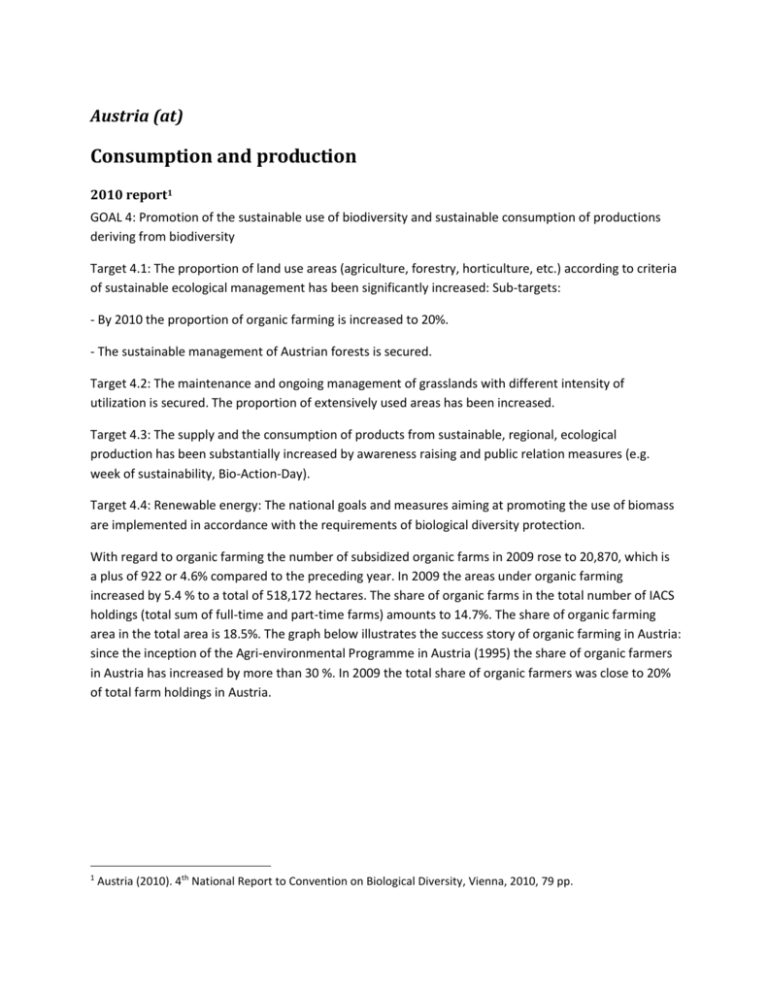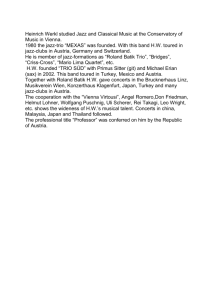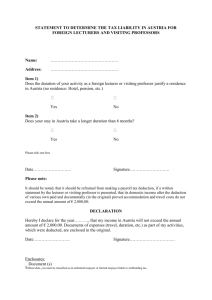Austria - Convention on Biological Diversity
advertisement

Austria (at) Consumption and production 2010 report1 GOAL 4: Promotion of the sustainable use of biodiversity and sustainable consumption of productions deriving from biodiversity Target 4.1: The proportion of land use areas (agriculture, forestry, horticulture, etc.) according to criteria of sustainable ecological management has been significantly increased: Sub-targets: - By 2010 the proportion of organic farming is increased to 20%. - The sustainable management of Austrian forests is secured. Target 4.2: The maintenance and ongoing management of grasslands with different intensity of utilization is secured. The proportion of extensively used areas has been increased. Target 4.3: The supply and the consumption of products from sustainable, regional, ecological production has been substantially increased by awareness raising and public relation measures (e.g. week of sustainability, Bio-Action-Day). Target 4.4: Renewable energy: The national goals and measures aiming at promoting the use of biomass are implemented in accordance with the requirements of biological diversity protection. With regard to organic farming the number of subsidized organic farms in 2009 rose to 20,870, which is a plus of 922 or 4.6% compared to the preceding year. In 2009 the areas under organic farming increased by 5.4 % to a total of 518,172 hectares. The share of organic farms in the total number of IACS holdings (total sum of full-time and part-time farms) amounts to 14.7%. The share of organic farming area in the total area is 18.5%. The graph below illustrates the success story of organic farming in Austria: since the inception of the Agri-environmental Programme in Austria (1995) the share of organic farmers in Austria has increased by more than 30 %. In 2009 the total share of organic farmers was close to 20% of total farm holdings in Austria. 1 Austria (2010). 4th National Report to Convention on Biological Diversity, Vienna, 2010, 79 pp. Graph: Development of number of organic farms in Austria (Source: Grüner Bericht 2010) Many activities are carried out in Austria aiming at increasing consumers’ awareness with regard to products coming from sustainable, regional, ecological management. The initiative “Genussregion Österreich” (Region of Delight Austria) set by the Austrian Federal Ministry of Agriculture, Forestry, Environment and Water Management is aiming at promoting regional food specialities, and thus contributing to regional diversity as well as to combating climate change. Surveys have shown a trend of consumers to regionally produced, healthy food in Austria. The initiative is aiming at meeting this trend in Austria. The initiative cooperates with the food trade and respective chains as well as with the gastronomy. Another initiative aiming at promoting consumers awareness are the “Sustainability weeks” in Austria taking place every year, also in cooperation with the private sector. Austria has set itself the goal of achieving by 2020 a share of 34 % of renewable energy. As member of the European Union Austria has to implement the sustainability criteria for biofuel production laid down in the EU Directives 2009/28/EC and 2009/30/EC. Technology Austria reported2 the following: 2 Austria (1997). First Austrian National Report on the Convention on Biological Diversity, Federal Ministry for the Environment, Youth and Family, Vienna, June 1997, 63 pp. In joint projects, non-proprietary technologies are transferred at the level of scientific cooperation. Above all, applied aspects and technological know-how are developed and disseminated in this framework. From the Austrian perspective, a greater effort should be made to transfer green technologies in the framework of aid and development programs. The private sector, however, plays an especially important role in this sector. Austria's position is directed at working toward a European initiative on this issue. 2005 report3 There are no systematic measures or mechanisms in place, but access to technologies is facilitated on a case by case basis. Austrian Development Co-operation is funding various post graduate university courses related to sustainable resource use, e.g. a post graduate course in limnology or a master programme in mountain forestry. In addition Austrian PHD scholarship programmes support PHD students who are working inter alia in the field of conservation and sustainable use of biodiversity. Forest Sector: The Austrian Research and Training Centre for Forest, Natural Hazards and Landscape (BFW), in collaboration with the International Plant Genetic Resources Institute (IPGRI) initiated a Research Fellowship on the conservation of forest genetic resources (duration 2004-2009). An individual work programme will be elaborated and will include data gathering and preparation of research material in the home country. DNA technologies and modern molecular methods will be used. To promote sustainability of the research skills acquired, each fellow will receive coaching following his/her return to the home institute at the end of the fellowship. The research will focus on topics relevant to the applicant’s home country. Austrian funded PHD scholarships have been quite successful due to the fact that applicants are preferred, who are already working in local research institutions or authorities. They are able to conduct their research on problems relevant to those institutions and are able to apply their findings after their return at their respective work places. Austrian Development Co-operation has recently established guidelines and mechanisms to promote private sector engagement in development activities through e.g. public private partnerships. One of the priority areas for PPPs are co-operations in the environmental sector. Compliance with international environmental standards is a key requirement of any cooperation under these mechanisms. 3 Austria (1997). First Austrian National Report on the Convention on Biological Diversity, Federal Ministry for the Environment, Youth and Family, Vienna, June 1997, 63 pp.






